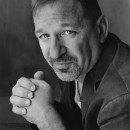David Biespiel
Poetry

Website: http://atticinstitute.com/
- Biography
Biography
David Biespiel is a contributing writer at The Rumpus, Partisan, American Poetry Review, Politico, New Republic, Slate, Poetry, and The New York Times, among other publications. He is the author of numerous books of poetry, most recently Charming Gardeners and The Book of Men and Women, which was chosen one of the Best Books of the Year by the Poetry Foundation and received the Stafford/Hall Award for Poetry. His books of essays include A Long High Whistle: Selected Columns on Poetry and a book on creativity, Every Writer Has a Thousand Faces. He is a member of the board of directors of the National Book Critics Circle. Recipient of Lannan, National Endowment for the Arts, and Stegner fellowships, he has taught at Stanford University, University of Maryland, George Washington University, Portland State University, and Wake Forest University, in addition to other colleges and universities. He is a longtime faculty member in the School of Writing, Literature, and Film at Oregon State University and is the founder of the Attic Institute of Arts and Letters in Portland.
Mentor. Workshops and classes in poetry.
Statement: “Every society we’ve ever known has had poetry, and should the day come that poetry suddenly disappears in the morning, someone, somewhere, will reinvent it by evening. Since ancient times, as long as we’ve had language, poetry has ritualized human life. It has dramatized and informed us with metaphors and figures of feeling and thought, mysteries and politics, birth and death, and all the occasions we experience between womb and tomb. Poetic utterance ritualizes how we come to knowledge. Poetic form ceremonializes those rituals. In the same way that poems illuminate our individual lives, poems also help us understand ourselves as a culture. Or at least they spur us to ask the questions. Poetic utterance mythologizes our journey of being. Poetic utterance tells and interprets our stories. Poetic utterance shapes our perspective of the mysteries of the present moment and helps us imagine the next one. Walt Whitman says it beautifully — when he calls on us to join the communion between poet and human aspiration — when he writes, ‘And what I assume you shall assume, For every atom belonging to me as good belongs to you.’ In this way poetry connects us to our past, and poets unmask both private and civic memories, dreams, and daily urgencies. By harmonizing the body with the mind, serving both young and old, poetry is a guide to deliver us into a fresh engagement with our inner lives and with modernity. If we care about order and disorder, then poetry matters because it is the art of the utterance of beauty and the grotesque. If we care about the deepest aspirations of men and women across every community and culture, language and race, then poetry is always relevant because it is the art of the utterance of what we share in our innermost psyches. Since culture and society existed both before we live and after we die, poetry is a link to our passage through our own time and a record of poets’ perspectives throughout time. We know that human beings are intrinsically connected to one another in how we assert our being. When we read a poem, we are in the presence of this link. We are open to the metaphors of our shared natures. Because poets have the highest faith that every word in a poem has value and implication and suggestion, a poem orients us in both our inner and outer existence. No matter what language we speak, we follow the guidance of poetry to better perceive sorrow and radiance, love and hatred, violence and wonder. No matter what continent we call home, we read poetry to restrict us in time and to aspire toward timelessness.”



Social Media